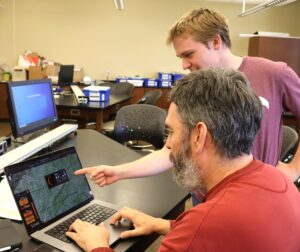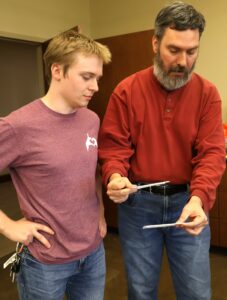GREENEVILLE – Community members who want to see the partial solar eclipse from an excellent vantage point should plan to be at Tusculum University Monday, April 8.

Dr. Chuck Pearson, left, and student Joseph Medeck look at the website for NASA Eclipse Explorer and see how the sun is expected to appear at 3:09 p.m. Monday, April 8.
Tusculum’s Bonner Leader Program, a student service organization, and College of Science, Technology and Mathematics are partnering to host a viewing party from 2:30-3:30 p.m. at Pioneer Field. The public is invited to join Tusculum’s faculty, staff and students for this rare scientific wonder.
The first 100 attendees will receive free eclipse glasses. People should not look directly at the sun during this event without quality eclipse glasses.
“The partial solar eclipse will be a lot of fun to observe as long as the weather cooperates and people take the appropriate precautions,” said Dr. Chuck Pearson, chair of the university’s Natural Sciences Department and a chemistry and physics professor. “The scientific elements of the eclipse are also fascinating, so this will a great active and experiential learning opportunity for people of all ages. We encourage everyone to join us for this special scientific moment.”
During the event, Dr. Pearson will narrate the process of the eclipse as it happens. Joseph Medeck, a sophomore chemistry major and one of the Bonner leaders, will create a scientific information poster.
In addition to the opportunity to view the partial eclipse directly through eclipse glasses, attendees will be able to look at it indirectly through a pinhole camera. The pinhole camera method involves poking holes in a white index card, holding the card in front of oneself and allowing the eclipsed sun to pass through it to a second index card or piece of white paper. The effect is essentially the same as looking directly at the sun but does not require eclipse glasses.
Dr. Pearson will demonstrate the pinhole camera method during the Pioneer Field event.

Dr. Chuck Pearson, right, and student Joseph Medeck demonstrate in a rudimentary way the pinhole method of viewing the eclipse.
While East Tennessee will not experience a total solar eclipse, Dr. Pearson said the region will enjoy a substantial amount of darkness. He said the partial eclipse will create some shadows on bushes that will be impressive to see and recognize as an effect of the moon covering a portion of the sun.
Even if the weather is overcast, people will still see noticeable effects from the eclipse, Dr. Pearson said.
For those who want to purchase their own glasses, Dr. Pearson recommends not utilizing an online source but instead going to in-person store. He said that is the best approach to ensure people in the community obtain glasses that will sufficiently protect their eyes.
Having the community on campus will be a great addition to the scientific event that will take place, Medeck said.
“We thoroughly enjoy connecting with the community through service opportunities and look forward to having visitors on campus for this spectacular event,” he said. “We are grateful to Dr. Pearson and the rest of College of Science, Technology and Mathematics for partnering with the Bonner Leaders. All of us will learn a tremendous amount from witnessing this phenomenon firsthand and have a great time speaking with each other.”
Anyone with questions can contact Dr. Pearson at cpearson@tusculum.edu. More information about the university is available at www.tusculum.edu.


